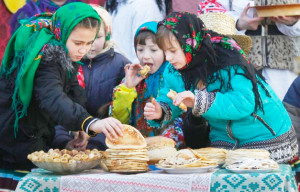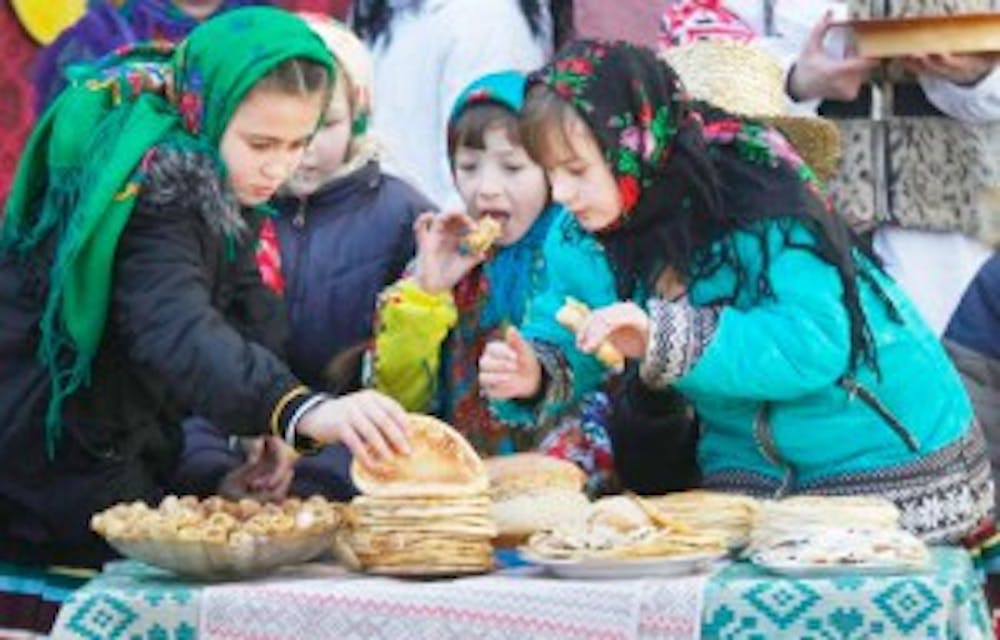By Erin Cooper
Staff Writer
If you’re planning to attend a Russian pancake holiday celebration, here’s a word of advice: Get there early. The pancakes go fast, as they did on Tuesday, March 22, when the Russian program at the College celebrated the popular Russian Mardi Gras holiday known as Maslenitsa.
The week-long festival was celebrated from Monday, March 7, to Sunday, March 13, and welcomed spring to the country known for its long, brutal winters. The star attraction of the holiday is blini, a crepe-like pancake that is as delicious as it is thin.
“It’s a pre-Lent celebration,” said Geoff Cebula, the College’s Russian program coordinator. “The name comes from the word for ‘oil’ or ‘butter.’ You eat a lot of delicious food before Lent starts.”

Although the celebration is now a part of Lent, it had its beginnings in early pagan Russia.
“It’s a celebration that has very deep cultural roots. It’s been around for known cultural history. A lot of Orthodox Christians celebrate (it) as part of the Lent calendar,” Cebula said, but it is not a purely religious holiday. “Having a big family cooking thing is a non-denominational thing. It’s a big national event.”
It was also a big event in Forcina Hall, with a higher attendance than expected, as students crowded around the table laden with Russian delicacies and descended on the blini.
One of the many people responsible for the blinis’ disappearance was junior psychology major Elena Allen.
“I ate like 15 of them,” she said through laughter. “They’re so good.”
Allen is one of the College’s students of Russian descent.
“I was actually born in Russia and I was adopted when I was a year old,” she said. Allen heard Russian for the first year and a half of her life, but was too young to truly know the language. “I would say ‘da’ and ‘nyet’ and that’s it.”
Allen said she chose to study Russian at the College to reconnect with her heritage.
“It was a great opportunity to learn it in a setting with other kids... I think the language is really beautiful. Once you start learning it phonetically, it really sounds gorgeous.”
Fortunately, for any late-comers who missed out on blini, there were a number of other Russian foods and beverages available. Adjunct Russian instructor Emily Wang was happy to describe them to anyone unfamiliar with Russian food. Wang pointed out the colorful bags of pryaniki — Russian honey spice cookies and sushki crackers. The slightly sweet, round sushki were even multipurpose.
“They look like rings, and in the olden days, people used to make necklaces out of them and wear them,” Wang said.
Anyone without a sweet tooth could try fish and cheese with brown bread or a Russian salad called vinegret, which is made with beets and other cubed vegetables. For a drink, there was kvass, a beverage made from fermented bread that tastes vaguely like root beer and mors, a sweet cranberry juice.
Wang is not of Russian descent, but an interest in Russian literature inspired her to study the language in college and she never stopped. Wang wants to show people a side of Russian culture that may be missing from the headlines.
“It’s easy to think of aspects of Russia that are more intense,” she said, but then there is the food and the fun and, more importantly, the people. “There are a lot of people of Russian and Slavic heritage here at TCNJ. Russian culture’s also one of the most important cultures in the world.”
Cebula agrees.
“It’s a massive, incredibly important culture,” he said. “A lot of people might be more interested if they knew more about it.”
The Russian program here at the College aims to not only provide a place for students of Russian heritage to connect and speak Russian, but to also reach out to the broader campus community with events like this one.
For those who missed Maslenitsa this year and want to experience Russian culture, there are other options available.
“I would recommend Bell’s Market (in Philadelphia),” Wang said. “It’s an enormous Russian grocery store.”
Wang also recommended visiting Bear and Birch, a Russian spa in Freehold, N.J., or taking a trip to the Brighton Beach neighborhood of New York City.
“It’s really fun,” Wang said. “It’s kind of like a miniature version of Russia.”
Russian culture can be experienced without leaving campus, too.
“We have a number of film screenings (on campus). Every Wednesday, we show Russian films,” Cebula said.
The Russian program also offers intensive Russian language courses and will be offering a class on the history of Russian film in Fall 2016.







